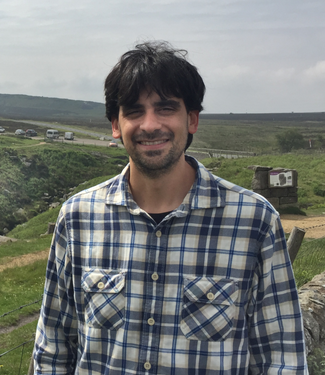
Sessions in which Daigard Ricardo Ortega Rodriguez participates
Tuesday 28 June, 2022
Chemical traits of tree-rings are sparsely used for dendroclimatic analysis. The difficulty of the laboratory process to obtain these proxies and understand their physiological relationship with meteorological variables have limited the development of dendrochemistry in tropical forests. Here, we show the first Micro X-ray fluorescence (µXRF) time series of chemical elements from Cedrela fissilis trees growing in southern Brazilian Amazon. We assess the relationships among wood traits (wid...
Wednesday 29 June, 2022
Session reescheduled from June 28th to June 29th
Chemical traits of tree-rings are sparsely used for dendroclimatic analysis. The difficulty of the laboratory process to obtain these proxies and understand their physiological relationship with meteorological variables have limited the development of dendrochemistry in tropical forests. Here, we show the first Micro X-ray fluorescence (µXRF) time series of chemical elements from Cedrela fissilis trees growing in southern Brazilian Amazon. We assess the relationships among wood traits (wid...
Thursday 30 June, 2022
Methodological advances in the latest years have opened new perspectives for dendrochonological studies by facilitating the visualization, delimitation, and analyses of tree-rings. These novel methodologies have incorporated complementary physical and chemical parameters to the traditional anatomical procedures used to describe annual growth rings. Here, we present the results of new studies which explore the relationships among wood density features and chemical elements involved in the a...
Dendrochronological archives in the tropics of the Americas have been under-studied for a long time. Some of the challenges include the Identification of tree-ring boundaries in certain tree species, absence of winter dormancy associated to low temperatures in most of the cases, and logistic difficulties of fieldwork in remote sites. However, part of the slow progress is also related to the fact that historically much less resources have been inv...
Sessions in which Daigard Ricardo Ortega Rodriguez attends
Tuesday 28 June, 2022
Tree-ring time series provide long-term, annually resolved information on the growth of individual trees. However, public tree-ring archives contain a considerable portion of data collected from trees that have been selected with specific research questions in mind (e.g., for climate reconstruction). This makes these archives a biased representation of the sensitivity of forest ecosystems to ongoing climate variation (e.g. temperature, precipitation), including non-stationarity (i.e....
Wednesday 29 June, 2022
Information garnered from historical timbers and wooden artifacts (e.g. houses, barns, ships) can greatly enhance our understanding of human, ecological, and climate history, especially in regions where few old-growth forests and trees remain, tree longevity is relatively short (less than 300-400 years), and environmental conditions break down wood rather quickly, like in mesic to wet regions Over the last decade plus, the application of tree-ring techniques on woo...
Hydroclimate variability in tropical South America is strongly regulated by the South American Summer Monsoon (SASM). However, past precipitation changes are poorly constrained due to limited observations and high-resolution paleoproxies. We found that summer precipitation and the El Niño-Southern Oscillation tarapacana (ENSO) in the Chilean variability and Bolivian are well registered Altiplano in in tree-ring the Central stable Andes oxygen (18–22°S, isotopes ∼4,500 (δ18OTR) m a.s.l.) of...
It has been shown that trees get older in the wet tropics, but the mechanisms behind this observation are still not clear. Literature shows that moisture could directly affect longevity by modulating physiological processes of trees. Other studies point to the potential role of water on tree size, which could indirectly affect longevity if one reconciles to the fact that the growth rate of tropical trees doesn’t differ significantly between wet and dry sites. The third group points to the ...
Presentation of all Ameridendro2022 posters.FREE LUNCH FOR ALL ATTENDEES!
Recent studies have shown that long-lived tropical trees are able to recover from senescence stages and maintain high rates of aboveground carbon and biomass accumulation throughout their life span. In this study, we present a tree-ring-based analysis to estimate the annual accumulation of aboveground biomass (AGB) and carbon (C-accumulation) of an Ocotea porosa tree over the last five centuries (1485–2016). The study site is located in southern Brazil, under a subtropical climate. AGB was...
Water scarcity is a major 21st century challenge that is increasing the vulnerability of the human population, especially in cities. Water risk assessment is a fundamental task in many cities worldwide that often lack long-term and spatially-resolved records of precipitation and level of water reservoirs. Past rainfall and reservoirs levels may be alternatively assessed using tree-ring stable isotopes of urban trees. We assessed the past variability of precipitation and reservoirs level th...
Thursday 30 June, 2022
How old are tropical trees? This fundamental question has long driven the curiosity of laymen and scientists. But only recently, a great number of studies conducted by many brave dendrochronologists resulted in a significant tree-ring-based knowledge that allows us to start accurately estimating tree ages across the globe. As science goes, not only knowing the longevity of tropical trees is essential to understanding forest dynamics and its role in biogeochemical cycles, but one must also ...
